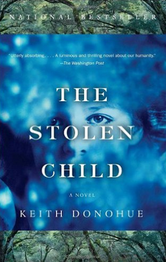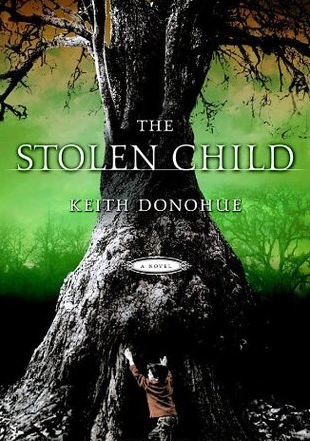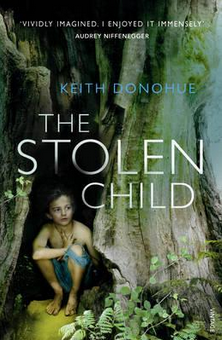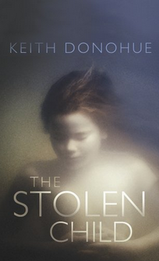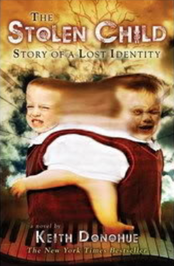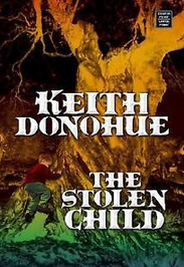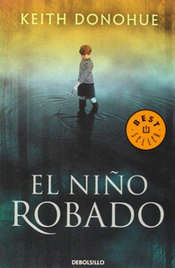The Stolen Child
(2006, Ages 17 and Up)
6/7/19
It’s not entirely surprising when kids and adults say want to trade places. Kids usually want the respect and power that only comes with age, and adults often wish they could go back to the days of boundless energy and carefree dreams. As for me, while I would never get rid of my inner child for anything, I really have no regrets leaving my childhood in the past where it belongs. There are plenty of tales out there that explore these ideas, sometimes by way of showing children literally becoming stuck in adults’ bodies and/or adults in children’s bodies, whether through body-switching or accelerated aging or de-aging, with the immediate results often being equal parts weird and hilarious. But when all is said and done, such scenarios typically end with said characters being returned to their proper ages and forms, wiser for the wear. But . . . what if that end didn’t come for years, or even decades? What if it never came at all? Would the result be depression? Confusion? Anger? Madness? Or maybe all of the above?
In 1949, seven-year-old Henry Day is kidnapped by changelings—wild, ancient, childlike creatures that dwell in the woods—and becomes one of them. Meanwhile, another changeling takes his place, reforming himself in Henry’s image and now living his life among the Day family. In time, they each learn to adjust to their new roles. The new changeling—renamed Aniday by his now-fellow changelings—must adapt to and survive their strange ways as well as the harsh wilderness, while the new Henry Day must cope with the ordinary but strenuous trials of adolescence. But even as the two boys overcome their respective ordeals and thrive in the years that follow, they are increasingly haunted by vague memories of their past and regretful of the humanity they lost at the hands of the changelings. Despite the risk of discovery and death by humans becoming ever greater as a result of their growing obsession, neither Henry nor Aniday will be able to rest until they understand who they once were and find a way to come to terms with each other and all of their identities.
Keith Donohue’s debut novel is inspired by the 1889 poem of the same name by famed Irish poet, William Butler Yeats, about fairies beguiling and tempting a human child to run away with them. In relation to this book, I think the romantic implications of Yeats’ poem are painfully ironic. Donohue keeps the primary lore about the human/fairy switch intact, but that’s where the similarities end. His changeling band is indigenous hunter-gatherer tribe, wolf pack, and kids’ street gang all rolled into one. They survive off the land while also organizing raids in order to steal clothes and supplies for protection against the elements as well as for amusement. It’s almost like observing an ongoing slumber party at a permanent summer camp, albeit with kids under ten smoking and even lovemaking at times.
Henry and Aniday tell their stories years after their respective switches occurred, thus their “adult” voices and minds are consistent even when they are “children”. In spite of the radically different lives they once lived and are living now, they still cherish their humanity more than anything, and often show their disgust at the changelings’ conduct. The boys fear losing not only their personal memories, but the very memory of being human. Thus they each turn to a hobby that epitomizes what separates humans from animals: the arts.
Aniday takes to reading, writing, and drawing, I think in part because, having lived only seven human years before being taken, it’s really all he knows at that point—and to his dismay, it shows. Between the limitations of his used and stolen art supplies and his initial pitiful lack of artistic ability, his desperation to keep alive what he believes to be his true self is palpable:
“[. . .] Up and out of bed, I savored the light growing strong enough for drawing and writing. I took out my papers and pencil, put a cold flat stone on my lap, and folded the mortgage statement into quarters. I drew a cross along the folds and made panels for four drawings. The pencil was at once odd and familiar in my grasp. In the first panel, I created from memory my mother and father, my two baby sisters, and myself, full-body portraits lined up in a straight row. When I considered my work, they looked crude and uneven, and I was disappointed in myself.
[. . .]
“Writing proved more painful than drawing. Certain letters—B,G,R,W—caused my hand to cramp. In those early writings, sometimes my K bent backwards, S went astray, an F accidentally became an E, and other errors that are amusing to me now as I look back on my early years, but at the time, my handwriting caused me much shame and embarrassment. Worse than the alphabet, however, were the words themselves. I could not spell for beans and lacked all punctuation. My vocabulary annoyed me, not to mention style, diction, sentence structure, variety, adjectives and adverbs, and other such matters. The physical act of writing took forever. Sentences had to be assembled nail by nail, and once complete, they stood no better than a crude approximation of what I felt or wanted to say, a woebegone fence across a white field. Yet I persisted through that morning, writing down all I could remember in whatever words I had at my command.” (Pg. 51-53)
For his part, Henry couldn’t be happier being a normal human once more—or more terrified that it could end all over again. He finds his artistic calling in music. After the initial difficulty of “mastering” the piano at a rate not unusual for a young boy, his imagination is enriched and his soul stirred in a way they could never be when he lived among the callous and unrefined changelings:
“For the next eight years, I took piano lessons, and it was the happiest time of all my lives. [. . .] On Wednesdays and Saturdays, the trip to the city proved a tonic, away from farm and family and into civilization. No longer something wild, but a creature of culture, on my way to becoming a virtuoso once again.” (Pg. 44)
[. . .]
The glory of the experience rested in the simple fact that my musical talent was a human one. There were no pianos in the woods. And as my magic slowly diminished, my artistry increased. I felt more and more removed from those who had taken me for a hundred years, and my sole hope and prayer was that they would leave me alone.
[. . .]
I played every chance I could get. Over the next few years, I spent hours each day at the keys, enthralled by the mathematics of the notes. The music seized me like a river current pushing my conscious self deeper into my core, as if there were no other sound in the world but one. I grew my legs an inch longer than necessary that first summer in order to better reach the pedals on the upright. Around the house, school, and town, I practiced spreading my fingers as far apart as they would go. The pads of my fingertips became smooth and feather-sensitive. My shoulders bowed down and forward. I dreamt in wave after wave of scales. The more adept my skill and understanding grew, the more I realized the power of musical phrasing in everyday life. The trick involves getting people to listen to the weak beats and seemingly insignificant silences between notes, the absence of tones between tones. By phrasing the matter with a ruthlessly precise logic, one can play—or say—anything. Music taught me great self-control.” (Pg. 55-57)
As the book progresses, we see how the boys’ actions directly and indirectly influence more than just each other. No matter how carefully Henry and Aniday try to distance themselves from each other’s races in order to protect themselves, their close proximity torments and endangers them both. But just as bad as their mortal danger, if not worse, is the psychological danger placed on those around them, namely when those victims wind up witnessing more than, and yet not as much as, they should:
HENRY’S POV:
“[. . .] [Dad’s] voice woke me at first light, and I followed the sound from my bedroom and through the back doorway. A feathery mist rose from the lawn and he stood, his back to me, in the middle of the wet grass, calling out my name as he faced a stand of firs. A dark trail of footsteps led into the woods ten feet in front of him. He was stuck to the spot, as if he had startled a wild animal that fled away in fear. But I saw no creature. By the time I drew near, the diminuendo of a few raspy calls of ‘Henry’ lingered in the air. Then he fell to his knees, bent his head to the ground, and quietly wept. I crept back into the house, and pretended to be reading the sports page when he came in. My father stared at me hunched over the newspaper, my long fingers wrapped around a coffee cup. The wet belt of his robe dragged along the floor like a chain. Soaked, disheveled, and unshaven, he seemed much older, but maybe I had not noticed before how he was aging. His hands trembled as if palsied, and he took a Camel from his pocket. The cigarette was too wet to light despite his repeated attempts, so he crumpled the whole pack and tossed it in the trash can. I set a cup of coffee in front of him, and he stared at the steam as if I had handed him poison.
‘Dad, are you all right? You look a mess.’
‘You.’ He pointed his finger at me like a gun, but that’s all he said. The word hung in the air all morning, and I do not think I ever heard him call me ‘Henry’ again.” (Pg. 98-99)
ANIDAY’S POV:
“[. . .] The door swung open suddenly, petrifying me on the spot. A man came down the stairs, pausing on the next-to-bottom step to light a cigarette. Wrapped in a blue robe, the figure took one step forward, then lifted his foot, startled by the moisture. He laughed and cursed softly. The specter still did not notice me, though we faced each other—he at the edge of the house, and I at the edge of the forest. I wanted to turn around and see what he was looking for, but I stood frozen as a hare as the daybreak lifted around us. From the lawn, a chill rose in wisps of fog. He drew closer, and I held my breath. Not a dozen steps between us, he stopped. The cigarette fell from his fingers. He took one more step toward me. His brow creased with worry. His thin hair blew in the breeze. An eternity passed as his eyes danced in their sockets. His lips trembled when he opened his mouth to speak.
‘And we? Envy?’
The words coming to me did not make sense.
‘Is a chew? Atchoo? Can a bee, Houston?’
The sounds he made hurt my ears. At that moment I wished to be sleeping in Speck’s arms again. He knelt on the damp grass and spread out his arms as if he expected me to run to him. But I was confused and did not know if he meant me harm, so I turned and sprinted, as fast as I could go. The monstrous gargle from his throat followed me deep into the forest until, as suddenly, the strange words stopped, yet I kept running all the way home.” (Pg. 108-109)
What makes this all the more tragic is that, because the boys are telling only what they know from only their own perspectives, they never see or understand the full truth of either the sequence of events or each other’s true feelings the way the readers do. The more their lives intersect, the more the simple misunderstandings pile up. Like the lead-up to a war, the animosity between two well-meaning but very confused individuals from vastly different cultures intensifies until it comes to a head. What’s worse, their very natures forbid them from asking for help or bearing their souls to virtually anyone. And inner battles are often much harder to fight than outside ones.
Though not a revenge story at its core, it does illustrate a struggle between two sides with much at stake. An emotional and bittersweet tale of an identity crisis at its most hellish, The Stolen Child offers a highly unique take on the changeling legend that portrays the loss of innocence, the defining and preservation of humanity, and the relentless search for one’s true self. Out of all the changeling-related plots I’ve seen in other media, this novel is to me one of the most psychologically complex and existentially ambiguous, making a serious attempt to realistically address the implications of such a drastic change to one’s being. For when has a soul not felt lost and alone upon being ripped from all they know, never to see it again accept in memory?
CREDITS:
All images, audio, and links belong to their respective owners; no copyright infringement is intended.
All book excerpts are from The Stolen Child by Keith Donohue (First Anchor Books edition, May 2007; published by Anchor Books, a division of Random House, Inc).
MAIN THEME:
“The Call” – Briand Morrison and Roxann Berglund
In 1949, seven-year-old Henry Day is kidnapped by changelings—wild, ancient, childlike creatures that dwell in the woods—and becomes one of them. Meanwhile, another changeling takes his place, reforming himself in Henry’s image and now living his life among the Day family. In time, they each learn to adjust to their new roles. The new changeling—renamed Aniday by his now-fellow changelings—must adapt to and survive their strange ways as well as the harsh wilderness, while the new Henry Day must cope with the ordinary but strenuous trials of adolescence. But even as the two boys overcome their respective ordeals and thrive in the years that follow, they are increasingly haunted by vague memories of their past and regretful of the humanity they lost at the hands of the changelings. Despite the risk of discovery and death by humans becoming ever greater as a result of their growing obsession, neither Henry nor Aniday will be able to rest until they understand who they once were and find a way to come to terms with each other and all of their identities.
Keith Donohue’s debut novel is inspired by the 1889 poem of the same name by famed Irish poet, William Butler Yeats, about fairies beguiling and tempting a human child to run away with them. In relation to this book, I think the romantic implications of Yeats’ poem are painfully ironic. Donohue keeps the primary lore about the human/fairy switch intact, but that’s where the similarities end. His changeling band is indigenous hunter-gatherer tribe, wolf pack, and kids’ street gang all rolled into one. They survive off the land while also organizing raids in order to steal clothes and supplies for protection against the elements as well as for amusement. It’s almost like observing an ongoing slumber party at a permanent summer camp, albeit with kids under ten smoking and even lovemaking at times.
Henry and Aniday tell their stories years after their respective switches occurred, thus their “adult” voices and minds are consistent even when they are “children”. In spite of the radically different lives they once lived and are living now, they still cherish their humanity more than anything, and often show their disgust at the changelings’ conduct. The boys fear losing not only their personal memories, but the very memory of being human. Thus they each turn to a hobby that epitomizes what separates humans from animals: the arts.
Aniday takes to reading, writing, and drawing, I think in part because, having lived only seven human years before being taken, it’s really all he knows at that point—and to his dismay, it shows. Between the limitations of his used and stolen art supplies and his initial pitiful lack of artistic ability, his desperation to keep alive what he believes to be his true self is palpable:
“[. . .] Up and out of bed, I savored the light growing strong enough for drawing and writing. I took out my papers and pencil, put a cold flat stone on my lap, and folded the mortgage statement into quarters. I drew a cross along the folds and made panels for four drawings. The pencil was at once odd and familiar in my grasp. In the first panel, I created from memory my mother and father, my two baby sisters, and myself, full-body portraits lined up in a straight row. When I considered my work, they looked crude and uneven, and I was disappointed in myself.
[. . .]
“Writing proved more painful than drawing. Certain letters—B,G,R,W—caused my hand to cramp. In those early writings, sometimes my K bent backwards, S went astray, an F accidentally became an E, and other errors that are amusing to me now as I look back on my early years, but at the time, my handwriting caused me much shame and embarrassment. Worse than the alphabet, however, were the words themselves. I could not spell for beans and lacked all punctuation. My vocabulary annoyed me, not to mention style, diction, sentence structure, variety, adjectives and adverbs, and other such matters. The physical act of writing took forever. Sentences had to be assembled nail by nail, and once complete, they stood no better than a crude approximation of what I felt or wanted to say, a woebegone fence across a white field. Yet I persisted through that morning, writing down all I could remember in whatever words I had at my command.” (Pg. 51-53)
For his part, Henry couldn’t be happier being a normal human once more—or more terrified that it could end all over again. He finds his artistic calling in music. After the initial difficulty of “mastering” the piano at a rate not unusual for a young boy, his imagination is enriched and his soul stirred in a way they could never be when he lived among the callous and unrefined changelings:
“For the next eight years, I took piano lessons, and it was the happiest time of all my lives. [. . .] On Wednesdays and Saturdays, the trip to the city proved a tonic, away from farm and family and into civilization. No longer something wild, but a creature of culture, on my way to becoming a virtuoso once again.” (Pg. 44)
[. . .]
The glory of the experience rested in the simple fact that my musical talent was a human one. There were no pianos in the woods. And as my magic slowly diminished, my artistry increased. I felt more and more removed from those who had taken me for a hundred years, and my sole hope and prayer was that they would leave me alone.
[. . .]
I played every chance I could get. Over the next few years, I spent hours each day at the keys, enthralled by the mathematics of the notes. The music seized me like a river current pushing my conscious self deeper into my core, as if there were no other sound in the world but one. I grew my legs an inch longer than necessary that first summer in order to better reach the pedals on the upright. Around the house, school, and town, I practiced spreading my fingers as far apart as they would go. The pads of my fingertips became smooth and feather-sensitive. My shoulders bowed down and forward. I dreamt in wave after wave of scales. The more adept my skill and understanding grew, the more I realized the power of musical phrasing in everyday life. The trick involves getting people to listen to the weak beats and seemingly insignificant silences between notes, the absence of tones between tones. By phrasing the matter with a ruthlessly precise logic, one can play—or say—anything. Music taught me great self-control.” (Pg. 55-57)
As the book progresses, we see how the boys’ actions directly and indirectly influence more than just each other. No matter how carefully Henry and Aniday try to distance themselves from each other’s races in order to protect themselves, their close proximity torments and endangers them both. But just as bad as their mortal danger, if not worse, is the psychological danger placed on those around them, namely when those victims wind up witnessing more than, and yet not as much as, they should:
HENRY’S POV:
“[. . .] [Dad’s] voice woke me at first light, and I followed the sound from my bedroom and through the back doorway. A feathery mist rose from the lawn and he stood, his back to me, in the middle of the wet grass, calling out my name as he faced a stand of firs. A dark trail of footsteps led into the woods ten feet in front of him. He was stuck to the spot, as if he had startled a wild animal that fled away in fear. But I saw no creature. By the time I drew near, the diminuendo of a few raspy calls of ‘Henry’ lingered in the air. Then he fell to his knees, bent his head to the ground, and quietly wept. I crept back into the house, and pretended to be reading the sports page when he came in. My father stared at me hunched over the newspaper, my long fingers wrapped around a coffee cup. The wet belt of his robe dragged along the floor like a chain. Soaked, disheveled, and unshaven, he seemed much older, but maybe I had not noticed before how he was aging. His hands trembled as if palsied, and he took a Camel from his pocket. The cigarette was too wet to light despite his repeated attempts, so he crumpled the whole pack and tossed it in the trash can. I set a cup of coffee in front of him, and he stared at the steam as if I had handed him poison.
‘Dad, are you all right? You look a mess.’
‘You.’ He pointed his finger at me like a gun, but that’s all he said. The word hung in the air all morning, and I do not think I ever heard him call me ‘Henry’ again.” (Pg. 98-99)
ANIDAY’S POV:
“[. . .] The door swung open suddenly, petrifying me on the spot. A man came down the stairs, pausing on the next-to-bottom step to light a cigarette. Wrapped in a blue robe, the figure took one step forward, then lifted his foot, startled by the moisture. He laughed and cursed softly. The specter still did not notice me, though we faced each other—he at the edge of the house, and I at the edge of the forest. I wanted to turn around and see what he was looking for, but I stood frozen as a hare as the daybreak lifted around us. From the lawn, a chill rose in wisps of fog. He drew closer, and I held my breath. Not a dozen steps between us, he stopped. The cigarette fell from his fingers. He took one more step toward me. His brow creased with worry. His thin hair blew in the breeze. An eternity passed as his eyes danced in their sockets. His lips trembled when he opened his mouth to speak.
‘And we? Envy?’
The words coming to me did not make sense.
‘Is a chew? Atchoo? Can a bee, Houston?’
The sounds he made hurt my ears. At that moment I wished to be sleeping in Speck’s arms again. He knelt on the damp grass and spread out his arms as if he expected me to run to him. But I was confused and did not know if he meant me harm, so I turned and sprinted, as fast as I could go. The monstrous gargle from his throat followed me deep into the forest until, as suddenly, the strange words stopped, yet I kept running all the way home.” (Pg. 108-109)
What makes this all the more tragic is that, because the boys are telling only what they know from only their own perspectives, they never see or understand the full truth of either the sequence of events or each other’s true feelings the way the readers do. The more their lives intersect, the more the simple misunderstandings pile up. Like the lead-up to a war, the animosity between two well-meaning but very confused individuals from vastly different cultures intensifies until it comes to a head. What’s worse, their very natures forbid them from asking for help or bearing their souls to virtually anyone. And inner battles are often much harder to fight than outside ones.
Though not a revenge story at its core, it does illustrate a struggle between two sides with much at stake. An emotional and bittersweet tale of an identity crisis at its most hellish, The Stolen Child offers a highly unique take on the changeling legend that portrays the loss of innocence, the defining and preservation of humanity, and the relentless search for one’s true self. Out of all the changeling-related plots I’ve seen in other media, this novel is to me one of the most psychologically complex and existentially ambiguous, making a serious attempt to realistically address the implications of such a drastic change to one’s being. For when has a soul not felt lost and alone upon being ripped from all they know, never to see it again accept in memory?
CREDITS:
All images, audio, and links belong to their respective owners; no copyright infringement is intended.
All book excerpts are from The Stolen Child by Keith Donohue (First Anchor Books edition, May 2007; published by Anchor Books, a division of Random House, Inc).
MAIN THEME:
“The Call” – Briand Morrison and Roxann Berglund
EPISODE SONGS:
“Coming of Age” - Briand Morrison
“Coming of Age” - Briand Morrison
“The Art of Humanity” - Briand Morrison
“Who Are We?” - Briand Morrison
